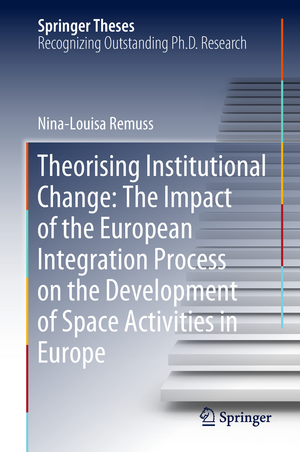Theorising Institutional Change: The Impact of the European Integration Process on the Development of Space Activities in Europe: Springer Theses
Autor Nina-Louisa Remussen Limba Engleză Hardback – 13 aug 2018
| Toate formatele și edițiile | Preț | Express |
|---|---|---|
| Paperback (1) | 677.20 lei 38-44 zile | |
| Springer International Publishing – 13 dec 2018 | 677.20 lei 38-44 zile | |
| Hardback (1) | 784.13 lei 6-8 săpt. | |
| Springer International Publishing – 13 aug 2018 | 784.13 lei 6-8 săpt. |
Din seria Springer Theses
- 18%
 Preț: 997.88 lei
Preț: 997.88 lei -
 Preț: 389.88 lei
Preț: 389.88 lei - 15%
 Preț: 646.94 lei
Preț: 646.94 lei - 18%
 Preț: 943.43 lei
Preț: 943.43 lei -
 Preț: 399.29 lei
Preț: 399.29 lei - 18%
 Preț: 944.99 lei
Preț: 944.99 lei - 15%
 Preț: 636.80 lei
Preț: 636.80 lei - 18%
 Preț: 941.05 lei
Preț: 941.05 lei - 15%
 Preț: 643.16 lei
Preț: 643.16 lei - 15%
 Preț: 642.68 lei
Preț: 642.68 lei - 18%
 Preț: 1103.62 lei
Preț: 1103.62 lei - 20%
 Preț: 558.83 lei
Preț: 558.83 lei - 18%
 Preț: 1112.30 lei
Preț: 1112.30 lei - 18%
 Preț: 944.19 lei
Preț: 944.19 lei - 18%
 Preț: 1109.92 lei
Preț: 1109.92 lei - 18%
 Preț: 1217.27 lei
Preț: 1217.27 lei - 15%
 Preț: 640.06 lei
Preț: 640.06 lei - 15%
 Preț: 636.45 lei
Preț: 636.45 lei - 15%
 Preț: 640.06 lei
Preț: 640.06 lei - 15%
 Preț: 640.88 lei
Preț: 640.88 lei -
 Preț: 389.70 lei
Preț: 389.70 lei - 20%
 Preț: 563.91 lei
Preț: 563.91 lei -
 Preț: 393.35 lei
Preț: 393.35 lei - 15%
 Preț: 637.93 lei
Preț: 637.93 lei - 15%
 Preț: 641.85 lei
Preț: 641.85 lei - 18%
 Preț: 1225.94 lei
Preț: 1225.94 lei - 20%
 Preț: 551.36 lei
Preț: 551.36 lei - 18%
 Preț: 1229.10 lei
Preț: 1229.10 lei - 15%
 Preț: 639.25 lei
Preț: 639.25 lei - 18%
 Preț: 999.45 lei
Preț: 999.45 lei - 15%
 Preț: 640.06 lei
Preț: 640.06 lei - 18%
 Preț: 1220.45 lei
Preț: 1220.45 lei - 18%
 Preț: 1116.26 lei
Preț: 1116.26 lei - 18%
 Preț: 1110.72 lei
Preț: 1110.72 lei - 18%
 Preț: 1000.87 lei
Preț: 1000.87 lei - 18%
 Preț: 891.17 lei
Preț: 891.17 lei - 15%
 Preț: 640.06 lei
Preț: 640.06 lei - 5%
 Preț: 1154.07 lei
Preț: 1154.07 lei - 15%
 Preț: 635.96 lei
Preț: 635.96 lei - 15%
 Preț: 640.88 lei
Preț: 640.88 lei -
 Preț: 387.20 lei
Preț: 387.20 lei - 18%
 Preț: 1109.92 lei
Preț: 1109.92 lei -
 Preț: 385.25 lei
Preț: 385.25 lei -
 Preț: 385.25 lei
Preț: 385.25 lei - 18%
 Preț: 1112.30 lei
Preț: 1112.30 lei - 18%
 Preț: 999.45 lei
Preț: 999.45 lei -
 Preț: 386.99 lei
Preț: 386.99 lei - 15%
 Preț: 637.13 lei
Preț: 637.13 lei - 20%
 Preț: 554.21 lei
Preț: 554.21 lei - 20%
 Preț: 555.59 lei
Preț: 555.59 lei
Preț: 784.13 lei
Preț vechi: 956.26 lei
-18% Nou
Puncte Express: 1176
Preț estimativ în valută:
150.04€ • 163.49$ • 126.43£
150.04€ • 163.49$ • 126.43£
Carte tipărită la comandă
Livrare economică 23 aprilie-07 mai
Preluare comenzi: 021 569.72.76
Specificații
ISBN-13: 9783319959771
ISBN-10: 3319959778
Pagini: 232
Ilustrații: XIX, 211 p. 9 illus., 8 illus. in color.
Dimensiuni: 155 x 235 mm
Greutate: 0.5 kg
Ediția:1st ed. 2018
Editura: Springer International Publishing
Colecția Springer
Seria Springer Theses
Locul publicării:Cham, Switzerland
ISBN-10: 3319959778
Pagini: 232
Ilustrații: XIX, 211 p. 9 illus., 8 illus. in color.
Dimensiuni: 155 x 235 mm
Greutate: 0.5 kg
Ediția:1st ed. 2018
Editura: Springer International Publishing
Colecția Springer
Seria Springer Theses
Locul publicării:Cham, Switzerland
Cuprins
Introduction.- Methodology and theoretical framework.- Empirical study: the development of space policy in Europe.- Theoretical discussion.- Conclusions and synthesis.
Textul de pe ultima copertă
The book provides a structural analysis of the European space effort from an institute change perspective. It analyzes the EU-ESA inter-institutional relationship, gives an overview of the development of space policy in Europe, and advances the debate about the impact of the European integration process on existing institutional actors. While European Space collaboration was initially developed outside the competences of the European Union (EU) with space programmes being carried out almost exclusively under the framework of European Space Agency (ESA) and national agencies, the EU has gained “shared competences” (Art. 2, TFEU) in space policy following the adoption of the Lisbon Treaty. Currently the EU and ESA work together under a Framework Agreement. In 2016, the EU Commission has published a Communication entitled “European Space Policy” (ESP). Even though ESA’s Member States have agreed to keep ESA as an intergovernmental organisation during the ESA Ministerial Council of 2014, the discussion about ESA becoming part of the EU framework continues. The EU’s ambitions for leadership in European space policy raise question concerning the future of ESA. The study of institutions lies at the heart of political sciences. Strikingly the theoretic framework qualifying institutional change and making it comparable leaves room for more concrete and testable dimensions of institutional change.
Caracteristici
Presents a structural analysis of the European space effort from an institute change perspective Analyzes the EU-ESA inter-institutional relationship Provides an updated overview of the development of space policy in Europe
